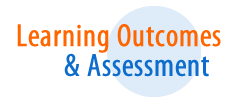Outcomes - M.S., Microbiology

Seton Hall University embraces the principle that effective and meaningful assessment is an integral part of the educational process. This principle is at the heart of our commitment to meet our responsibilities to our students, professions, and the communities that we serve.
Goal 1: Expand student knowledge and skills in the field of biological sciences with an emphasis on microbiology.
Objective 1: Expand the basic science foundation.
Students will learn in-depth concepts of biology with focus on microbiology through
various graduate courses. This knowledge will provide students with insight into the
complexity of microbiology and biological systems.
Objective 2: Research methods and laboratory skills
Students will be exposed to various research techniques through their own research
projects and by taking courses with the laboratory components. Via their exposure
to research, students will obtain hands-on experience on modern technology information
and scientific methods, while enhancing their understanding on the applicability of
science.
Objective 3: Integrate the acquired knowledge and skills.
Students will develop and comprehend the linkage between the knowledge and its application
in research. Furthermore, students will recognize the application and limitations
of scientific findings. Specifically, students will:
- Demonstrate the solid foundation of understanding biological and microbiology systems.
- Demonstrate understanding the updated bio related information and technology.
- Demonstrate understanding the research methods and developing the laboratory skills.
- Learn to identify gaps and limitation in biological knowledge, scientific hypothesis, data analysis and interpretation, and dissemination.
Goal 2: Develop and complete a research project as well as communicate the findings effectively using written and oral format.
Objective 1: Develop and execute a research project by applying the acquired knowledge
and skills
Students will learn to perform effective scientific literature searches and develop
the skill of collecting information relevant to their research projects. In addition,
students will develop the ability to construct hypotheses, utilize critical thinking
to identify gaps in knowledge, and formulate scientific questions. Students with Research
Thesis will also perform experiments, analyze and interpret data, and draw logical
conclusions. Biostatistics, a core requirement for the course, will allow students
to analyze and interpret scientific findings accurately and effectively.
Objective 2: Communication
Students will communicate their scientific observations, analyses and discussion in
both written and oral format, typically required by their future professions. Specifically,
students will:
- Demonstrate the ability to read, understand, and critically review scientific papers.
- Demonstrate the ability to identify questions that can be addressed scientifically.
- Demonstrate the ability to select and use appropriate techniques and methodologies to do research.
- Demonstrate the ability to successfully complete laboratory procedures.
- Demonstrate the ability to successfully abide to laboratory rules and regulations.
- Demonstrate the ability to interpret data and draw conclusions scientifically.
- Demonstrate the ability to select, use, and cite the appropriate articles from literature search for their oral presentation and the written thesis as well as the final defense.
Objective 1: Professional and Career Development
Students will be able to implement the knowledge, skills and values of biological
sciences into occupational pursuits, making them attractive candidates in the job
market.
Objective 2: Perpetuate learning in the field of Biology beyond graduation Students will be able to continue their self-education by applying the learned knowledge and skills responsibly, in their professional environments. This will enhance the students’ understanding of the national and global issues related to the biological sciences, and provide them with an indispensable role in contributing to the resolution of such issues.
Specifically, students will apply learned knowledge and skills in selecting paths for further studies or formulating career choices. Students will recognize and understand the complexity and impact of scientific advancement for the society, and act responsibly.
